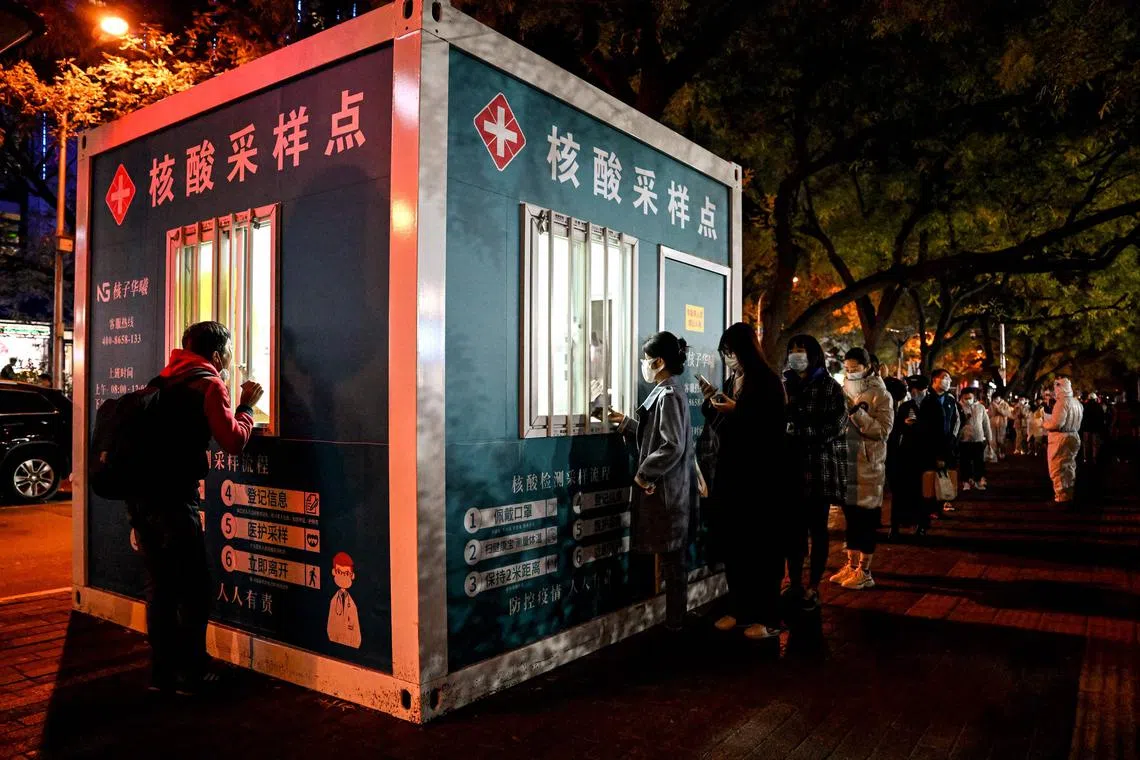Calibrating China’s Covid-19 strategy critical to sustaining recovery: IMF
Sign up now: Get insights on Asia's fast-moving developments

On Thursday, China’s daily Covid-19 cases surged again, as top cities struggle to get persistent outbreaks under control.
PHOTO: AFP
Follow topic:
BEIJING – China’s daily Covid-19 cases surged again on Thursday,
Nationwide, there were 23,132 new cases on Wednesday, the highest since April and nearing the all-time high reached during the worst of Shanghai’s massive outbreak earlier in 2022.
The surge is driven mostly by infections in major cities.
The southern hub of Guangzhou posted a record 8,761 cases. The authorities have extended some curbs for the downtown district of Haizhu, while easing measures in parts of two other districts that were previously locked down.
China’s daily infections have more than doubled since last Friday, when Beijing announced a raft of changes to its zero-tolerance strategy aimed at reducing the disruption caused by rules such as snap city-wide lockdowns and near-constant mass testing.
Even as that fuelled optimism that China may be contemplating a meaningful shift in its pandemic response, state media and officials have pushed back on the idea the tweaks to policies represent a relaxation.
Calibrating China’s zero-Covid-19 strategy to mitigate the pandemic’s economic impact will be critical to sustain and balance recovery in the world’s second-largest economy, the International Monetary Fund (IMF) said.
“For China, inflation and weakening growth allow for greater support for vulnerable households, which together with strengthening social safety nets would promote consumption,” the IMF’s first deputy managing director Gita Gopinath told the Caixin Summit on Thursday.
The People’s Daily, the Communist Party’s flagship newspaper, has issued a series of commentaries reiterating China’s commitment to stamping out Covid-19. Its latest, published on Thursday, said China is capable of achieving its dynamic zero-Covid-19 target and winning the pandemic fight.
China plans to speed up Covid-19 vaccinations and will release information to the public in due course, the head of China’s Centre for Disease Control and Prevention said on Thursday.
Professor Shen Hongbing made the comments at a regular National Health Commission (NHC) news conference when asked if foreign vaccines would become available. He did not elaborate on exactly how vaccinations would be sped up.
The authorities also highlighted the need to build more designated Covid-19 hospitals and increase the number of beds in intensive care units (ICUs).
“ICU beds need to account for 10 per cent of total beds,” NHC official Guo Yanhong said.
Several cities where cases are rising, such as Guangzhou and Beijing, are conducting mass testing, but other cities have pulled back on testing.
The NHC said it was not expanding the scope of who should be tested but was “increasing the number of people conducting the tests and the number of testing sites in busy areas”.
Guangzhou has also been a focus for China watchers as the city of 19 million people has used only targeted lockdowns in three districts, holding off on tougher and more widespread measures even as infections surged.
Elsewhere, Beijing saw a rebound in cases to 423. The metropolis of Chongqing reported more than 4,000 new cases. In the western region of Xinjiang, infections were near 1,000 even as its capital, Urumqi, endures the country’s longest lockdown since Aug 10. REUTERS, BLOOMBERG

